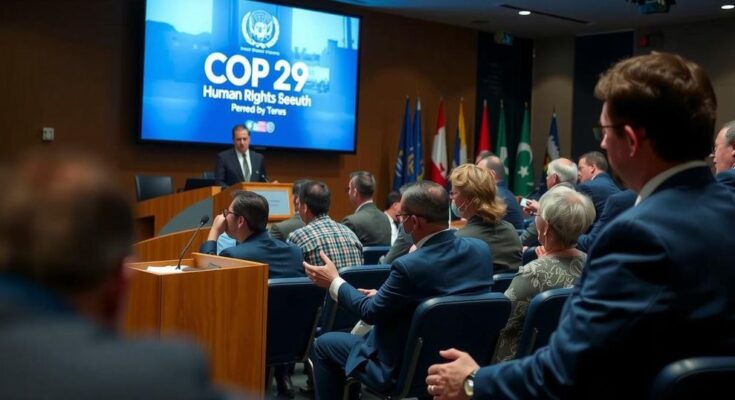The Azerbaijani government faces accusations of detaining climate activists during COP29, raising alarms among human rights groups. With over 300 political prisoners, critics contend that dissent is being suppressed under the guise of climate discussions. Calls are growing for more stringent criteria for selecting host countries for climate summits to ensure civil liberties are protected, as repression continues to overshadow crucial conversations on global warming solutions.
In a troubling development, the hosts of COP29 in Azerbaijan are facing mounting allegations from human rights organizations concerning the detention of climate activists and political dissidents. As discussions around global climate solutions grab international attention, critics argue that the Azerbaijani government is using this platform to stifle dissent rather than promote environmental progress. With claims of over 300 political prisoners, the situation paints a stark image of repression against those who dare to challenge government narratives. Martin Gustafsson, a member of the Climate Action Network, underscored the urgency of civil liberties in advancing climate initiatives. The Azerbaijani authorities, on the other hand, deny any such actions and assert that no political prisoners exist within their jurisdiction. Yet, since Azerbaijan was declared COP29’s host, there has been a disconcerting increase in arrests, drawing scrutiny from the international community. Natalia Nozadze of Amnesty International reported, “We’ve seen a dramatic increase in arrests and clamp down on all issues that the government may perceive critical or contrary to its political agenda.” These developments raise serious questions about the selection of host countries for such pivotal global events. Critics, including prominent journalists and activists, have warned against allowing nations with systemic human rights violations to take the lead in climate discussions. Emin Huseynov, an Azerbaijani journalist, stated poignantly that such choices undermine the essence of the climate conferences, suggesting that President Aliyev is more interested in using COP29 for image laundering than for fostering genuine climate action. As the world watches, activists like Gubad Ibadoglu and Anar Mammadli remain at the forefront, risking their freedom and well-being for the sake of ethical governance and environmental accountability. The voice of civil society, once an indispensable ally in the fight against climate change, is being consciously extinguished amid escalating political oppression.
The backdrop of COP29 reveals a disturbing trend of governments misusing international platforms to fortify their power, often at the expense of individual liberties. This year, Azerbaijan’s government stands accused of using the climate conference as a facade, drawing criticism reminiscent of previous hosts with controversial human rights records, such as the UAE and Egypt. With a climate crisis escalating globally, the importance of civil society in advocating for change and holding governments accountable cannot be overstated, making the current situation all the more alarming.
The unfolding situation in Azerbaijan against a backdrop of COP29 raises critical questions about the international protocols surrounding host country selection and the role of civil society in climate action. As repression escalates, it becomes evident that real progress hinges on the ability of activists to freely voice concerns and hold their governments accountable. If COP29 is to achieve meaningful advancements in climate change solutions, the plight of civil society must be addressed with urgency and integrity.
Original Source: www.bbc.com



